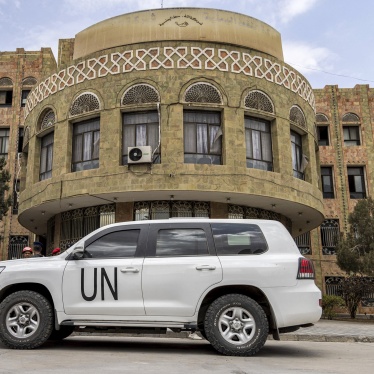(Beirut) – A Saudi court on July 6, 2014, sentenced the prominent human rights activist Waleed Abu al-Khair to 15 years in prison. The court convicted him on vague charges that stem solely from his peaceful activism, including statements to news media and tweets criticizing human rights abuses in Saudi Arabia.
The court suspended five years of the sentence, but it also included a 15-year ban on travel abroad after the prison term is served and a hefty fine, the Saudi Press Agency reported. Following the court hearing, Abu al-Khair’s organization announced that he will not sign or appeal the verdict.
“This outrageous sentence against Waleed Abu al-Khair shows how far Saudi Arabia will go to silence those with the courage to speak out for human rights and political reform,” said Sarah Leah Whitson, Middle East and North Africa director. “Saudi Arabia has invariably dealt harshly with its citizens who criticize Saudi policies, but putting a peaceful activist behind bars for at least a decade over his social media comments and statements to news media is a new low.”
Abu al-Khair is a lawyer and founder of the Monitor of Human Rights in Saudi Arabia. The government has refused to register his organization and the Justice Ministry has refused to license him as a lawyer, but he has defended numerous clients before Saudi courts as a legal advocate.
Abu al-Khair’s trial before the Specialized Criminal Court – Saudi Arabia’s terrorism tribunal – opened in October 2013. Abu al-Khair’s wife, Samar Badawi, told Human Rights Watch that the authorities jailed him on April 15, 2014, following his fifth trial session after the interior minister issued a detention order under the January 2014 terrorism law. The law gives the Interior Ministry the authority to jail suspects in terrorism cases.
Abu al-Khair refused to respond to the charges against him during the trial, Badawi said. He referred instead to a hand-written note he submitted to the judge declaring that he did not recognize the legitimacy of the court.
Badawi, who was in the courtroom when judge Yousef al-Ghamdi read the verdict, said that the court found Abu al-Khair guilty on six charges: “seeking to remove legitimate authority;” “harming public order in the state and its officials;” “inflaming public opinion and disparaging and insulting judicial authority;” “publicly slandering the judiciary, distorting the kingdom’s reputation, making international organizations hostile to the kingdom, and issuing unverified statements that harm the kingdom’s reputation and incite against it and alienate it;” “founding an unlicensed organization;” and violating Saudi Arabia’s anti-cybercrime law.
The charge sheet, which Human Rights Watch has reviewed, consists of little more than excerpts from statements he had made to various media outlets and tweets that criticize Saudi Arabia’s treatment of peaceful dissidents, especially harsh sentences against them by Saudi courts.
In October 2013, a criminal court in Jeddah convicted him on other charges, including “insulting the judiciary” and “attempting to distort the reputation of the kingdom,” and sentenced him to three months in prison. Earlier in October, Saudi authorities detained him two days for hosting a weekly discussion group for reformists, but prosecutors have yet to press criminal charges for that action.
Saudi courts have issued a string of harsh sentences against human rights activists in recent months, as the government has sought to silence its internal critics. The same court that sentenced Abu al-Khair imposed a 15-year prison term on Fadil al-Manasif, a human rights activist from the Eastern Province city of Qatif, on April 17. The court also banned him from travelling abroad for 15 years and fined him 100,000 Saudi Riyals (US$26,666). The charges against him included “breaking allegiance with the ruler” and “being in contact with foreign news agencies to exaggerate news and harm the reputation of Saudi Arabia and its people.”
On June 25, a criminal court in Riyadh sentenced Fowzan al-Harbi, a member of the Saudi Civil and Political Rights Association (ACPRA), to seven years in prison. The charges included “participating in, calling for, and inciting breaking allegiance with the ruler” and “describing the Saudi regime – unjustly – as a police state.” The judge suspended six years of the prison term on condition that al-Harbi does not return to his activism.
On July 3, Mikhlif al-Shammari, a rights activist who has worked to strengthen ties between members of Saudi Arabia’s Sunni majority and its Shia minority, informed Human Rights Watch that he lost his appeal against the five-year sentence that the Specialized Criminal Court imposed on him in June 2013, and that he expected authorities soon to summon him to prison.
“Saudi Arabia’s continuing crackdown on peaceful human rights activists makes a mockery of its membership of the UN Human Rights Council in Geneva, whose members are expected to promote and protect the very rights that the Saudi authorities are trampling underfoot,” Whitson said







